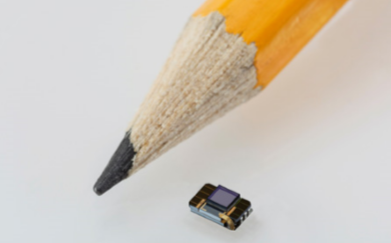Enabling Vision Restoration With Glass Encapsulation
NanoRetina announces successful preliminary results for its NR600 Artificial Retina Device using SCHOTT Primoceler’s glass laser bonding technology.
NanoRetina has taken a monumental step forward in establishing its retinal implant that could represent an answer to degenerative vision loss. SCHOTT Primoceler’s hermetic glass wafer micro bonding was used for the ultra-miniature, all-glass encapsulation of the device.
Tampere, Finland: Across the world, hundreds of thousands of people suffer from retinal degenerative diseases, including macular degeneration and retinitis pigmentosa. These ailments result in significant or even total vision loss, radically affecting day-to-day life. NanoRetina, with the help of SCHOTT Primoceler, has taken a major step towards changing this situation. They have developed an entirely new, less invasive, and high performing retinal implant with the first human trials successfully taking place.
A Promising Path Forward for Vision Restoration NanoRetina’s development of the NR600 device aims to restore vision to people blinded by retinal degenerative disease. The miniature implant enables a low-risk surgical procedure and quick recovery time.
The first human trials, started earlier this year among a European patient base, have produced exceptional results. "The device was activated for the first time, and the result was amazing: this patient had been completely in the dark for 5 years, and she immediately reported seeing an image in the center of her visual field when the device was activated, and could show with her hands the size of the image that she saw. I am very impressed by this experience. I have been working for more than 20 years as an ophthalmologist, but this is the first time I witnessed a completely blind patient being given back a visual perception,” stated Professor Peter Stalmans, one of Europe’s leading retinal specialists who performed the trial implantation of the device.
Partnership and Innovation with Hermetic Glass Encapsulation SCHOTT Primoceler and NanoRetina have a longstanding partnership dating back seven years to the beginning of this project. SCHOTT Primoceler’s signature glass wafer micro bonding technology is a perfect match for this application because of the benefits it delivers. The direct laser bonding method enables extreme miniaturization. For NanoRetina, this is an absolute requirement for this implant that lives inside the human eye. The ability to create a hermetic seal directly between glass interfaces is also essential to NanoRetina’s NR600 implant, as transparency is a must for precise optical performance. Finally, the implant is constructed of extremely small and complex electronic components. Exposing these to nearly any amount of heat would melt and destroy these components instantly. The miniscule heat-affected zone of the sealing area for glass wafer micro bonding makes it essentially a room-temperature process, enabling a hermetically sealed construction without risking any damage to the components of NanoRetina’s device.
“SCHOTT Primoceler’s unique technology enabled the realization of the NR600 miniature implant,” stated Ran Mendelewicz, NanoRetina’s Vice President of R&D. “The team in Finland have repeatedly proven that they are up to our challenges, and with their ‘can do’ approach, NanoRetina completed the development of a small, biocompatible, and hermetic device that will change the lives of visually impaired patients and their families around the world.”
In a time when good news is badly needed in the world, SCHOTT Primoceler is thrilled to be a part of this story of restoring vision to those suffering from blindness,” stated Ville Hevonkorpi, Managing Director of SCHOTT Primoceler Oy. “We have enjoyed excellent cooperation over the course of many years with our partners at NanoRetina and it has been a pleasure to see this transformative device move forward to becoming a reality for the treatment of vision loss.”

Size comparison demonstrating the extreme miniaturization of the NanoRetina NR600
SCHOTT is a leading international technology group in the areas of specialty glass, glass-ceramics and related high-tech materials. With over 130 years of experience, the company is an innovative partner to many industries, including the home appliance, pharma, electronics, optics, life sciences, automotive and aviation industries. SCHOTT has a global presence with production sites and sales offices in 34 countries. In the 2018/2019 fiscal year, the group generated sales of EUR 2.2 billion with over 16,200 employees. SCHOTT AG has its headquarters in Mainz (Germany) and is solely owned by the Carl Zeiss Foundation. This is one of the oldest private and largest science-promoting foundations in Germany. As a foundation company, SCHOTT assumes special responsibility for its employees, society and the environment.
Source: SCHOTT North America Inc.
